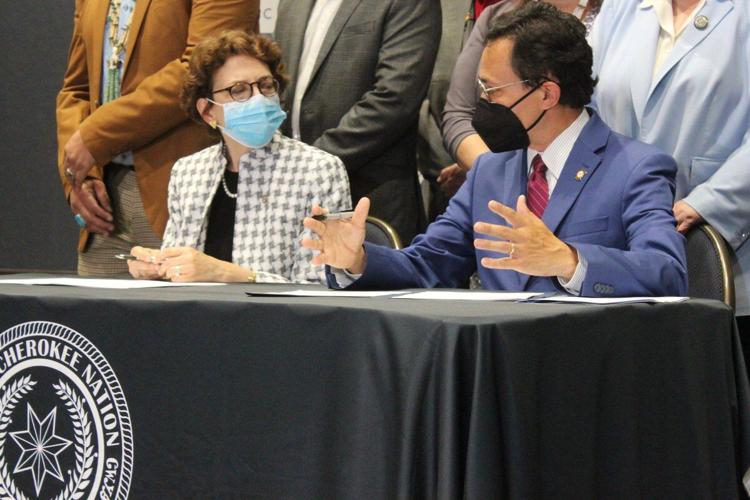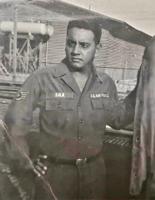U.S. Deputy Secretary of Transportation Polly Trottenberg visited the Cherokee Nation Tuesday, June 7, for a signing ceremony of a Tribal Transportation Self-Governance Program compact, the first of its kind in the country.
Arriving Tuesday afternoon at the Chota Conference Center in Tahlequah, Trottenberg greeted Principal Chief Chuck Hoskin Jr., Deputy Chief Bryan Warner and other tribal officials before heading into a briefing.
Warner greeted those in attendance and gave his thoughts on what he called a "historic event.”
“Now, we’re here today in our capital city of Tahlequah to sign the country’s Tribal first Transportation Self-Governance Program compact and funding agreement, and to say that we’re proud is an understatement,” said Warner. “This is a new chapter of government-to-government relationships with the United States, and it’s our hope that as all of Indian Country looks on, other tribal nations can and will follow suit.”
Warner then expressed how honored Cherokee Nation officials felt to be hosting Trottenberg. He sent his well wishes to U.S. Transportation Secretary Pete Buttigieg, who was originally scheduled to visit with Trottenberg, but had to cancel after he contracted COVID, according to the USDOT press office.
Taking the podium, Trottenberg thanked Warner and celebrated CN’s initiative for entering into this compact.
“Thanks to the Cherokee Nation’s leadership, every tribe in the country now has a model they can pursue in its own self-governance agreements,” said Trottenberg. “I am proud to be part of the Biden-Harris administration, and we are firmly committed to honoring tribal sovereignty, but also holding our solid trust and treaty responsibilities and empowering tribal self-government through agreements like this own, which will give the Cherokee Nation much needed and much-deserved flexibility and decision-making authority over federal funds to carry out transportation projects in this community.”
Trottenberg ended on a note of reaffirmation.
“With the signing of this agreement, we reaffirm once more the Cherokee Nation’s sovereign right to self-determination and our government-to-government partnership,” said Trottenberg.
After applause, Trottenberg turned the microphone over to Hoskin, who explained that the capacity of the Cherokee Nation to complete infrastructure work “could not be more important.”
“Leading all these efforts makes a big difference in the lives of everyone. It improves the economy,” said Hoskin. “The Cherokee Nation’s ability to do so much in the area of transportation and infrastructure means that the more we are empowered to again execute on this important mission, the better off people are overall, the better off our reservation is, the better off communities across our reservation are.”
Hoskin and Trottenberg then signed the TTSGP agreement.
Trottenberg was invited outside the conference center to see the CN’s fleet of electric vehicles and charging station, later riding with tribal officials to a CN road project in Fort Gibson.
The program is available for other tribes to apply for participation, with USDOT stating that it "provides federally recognized Tribes and Tribal organizations with greater control, flexibility, and decision-making authority over federal funds used to carry out tribal transportation programs, functions, services, and activities in tribal communities."


















Commented
Sorry, there are no recent results for popular commented articles.